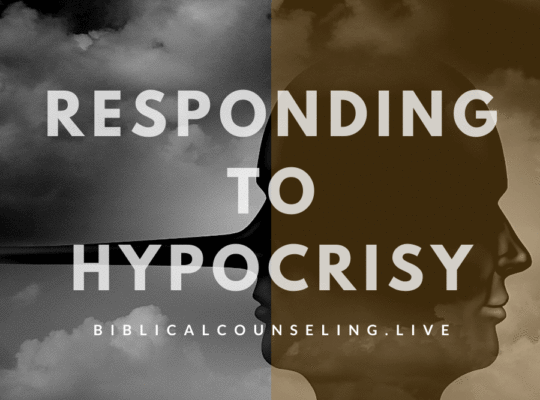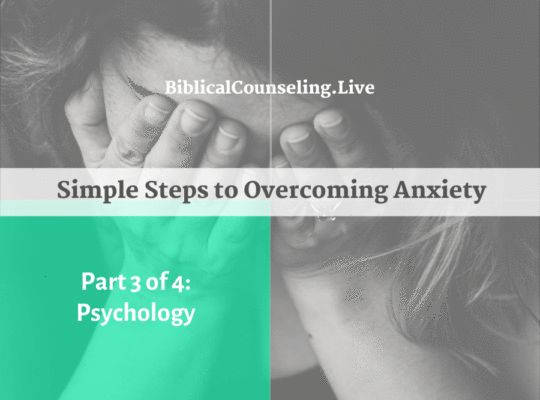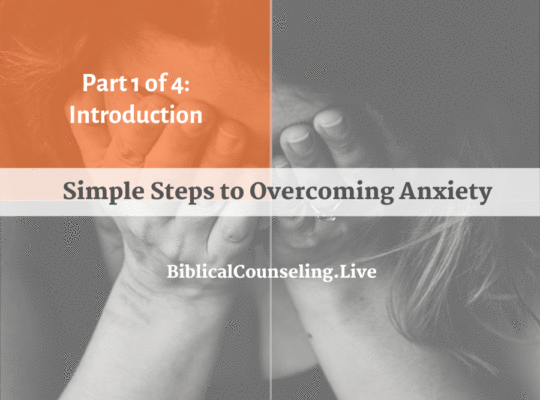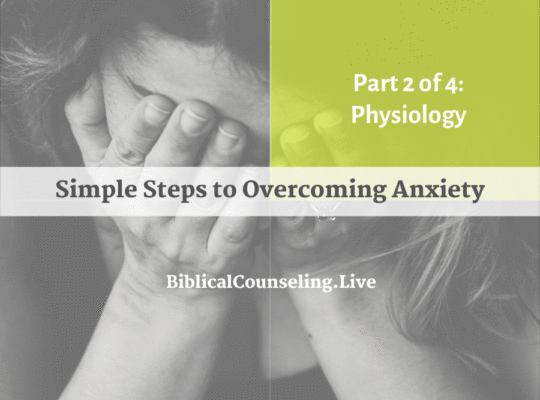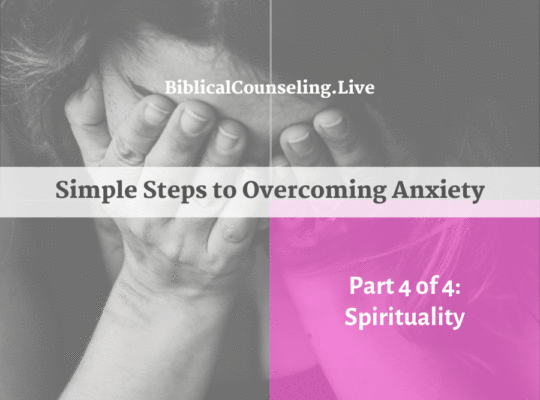Most blog posts I write are in response to something I have been working through on my own or in counseling others, and this one is no different. Like all of you, I have had to correct course many times in the last year of the pandemic as I have been overwhelmed by information coming from every direction.
I have made the mistake of thinking I found the right information — only to find out later that I was misinformed. I have made the mistake of sharing information that was false. I have needed to ask for forgiveness for making careless comments that were ill-timed or selfishly communicated. I have had to remind myself over and over that others have different points of view, different fears, and different idols they are worshiping, and therefore are responding to things differently than I am.
I tend to fall back on my intellect and my education in analyzing rhetoric when it comes to sorting through information; but in an age where “information” is a fluid word that includes gossip, speculation, lies, personal truth, bias, theory, fact, etc., I have found myself floundering. God has been kind to remind me that all of my worldly expertise and knowledge is no match for His wisdom.
God’s Word tells us how to respond to information we are given, whether that information comes through a personal conversation or through a media news source. Scripture gives us clear guidelines for evaluating and acting on the information we receive.
Here are some Simple Steps I’ve been using to think through what I hear and see:
1) Remember that people cannot be trusted.
That sounds pretty harsh, but the Bible is very clear that mankind is wicked. “There are none who are righteous, not even one” (Romans 3:10). If you keep reading in Romans, it gets worse: no one has understanding; no one seeks God; everyone uses their tongues to deceive; everyone has the desire to commit crimes, be unjust, and be cruel; no one seeks to live at peace with others (Rom. 3:11-18).
The Bible teaches us that unbelievers are enslaved to sin (John 8:34), and if we are wise, we must change our expectations of unbelievers to match this truth. On the other hand, we believers are no longer slaves to sin (Rom. 6:18, Eph. 2:1-10), but we still sin (Rom. 6:1-14). So, even as we interact with other believers, we know that they will be sinning against us, since they are just as sinful as we ourselves are.
Therefore, when people present to us words, in any form, we know that they are, by way of the sinful source, untrustworthy. Paul David Tripp, in War of Words says, “Every word we speak is rooted either in the truth or in a lie. Most of our communication problems come because we deceive, distort, and manipulate with our words. We reshape the facts to our advantage. We recast events, often to the point of convincing ourselves that our perspective is true” (p. 23). Even when we have the best intentions, our words cannot be trusted because they come from a heart that is naturally self-serving (Jer. 17:9, Jam. 1:14-16).
This might sound depressing, but it’s actually quite freeing. Many of my struggles with anger and bitterness are based on a false expectation of perfection from the people in my life. Nobody will ever live up to that, and neither will I live up to that expectation from others.
2) Remember that God CAN be trusted
Satan is the “father of lies” (John 8:44), and our Father is the “God of truth” (Is. 65:16, Heb. 6:18). Everything He says is pure truth and can be trusted completely (1 John 5:20).
Therefore, we can trust that God is who He says He is:
- He is in complete control over everything… He is sovereign (Prov. 16:33, Job 42:2, Lam. 3:37-39, Col. 1:16-17).
- He has complete understanding… He is omniscient (Is.46:9-10, Is. 40:13-14, Ps. 147:4-5).
- He has the power to reveal truth, and He will judge those who have lied and deceived… He is the Judge (Luke 8:17, Luke 12:2-3, 1 Cor. 4:5, 1 Tim. 5:24-25).
Trusting God is hard when we feel like we need to control everything in our lives, including the evaluation and interpretation of all the information that we receive. In addition, because we are created in God’s image, we feel the need to find out truth and deal out justice. This is a legitimate calling (Deut. 27:19, Is. 1:17, Jer. 22:3), but without the God-like qualities of sovereignty, omniscience, and righteous judgment, we cannot execute these tasks perfectly.
God knows this and has given us guidelines as to how we, in our limited state of knowledge and power, are supposed to decide who to believe, how much time and energy to spend on evaluating information, how to respond to untrustworthy information, and how to share and talk about that information.
Guideline 1: Believe only first-hand witnesses verified by more than one person
In a world of news stories that are written by people who never leave their desks, this is exceptionally important. “Source” news stories are written by one person who did the investigative reporting or researching himself/herself (and is therefore a second-hand witness). This source story is then used by the mainstream news media and is either re-published or re-reported with a new author quoting and re-framing the original story.
If you’ve ever played the game, “telephone,” or even tried to convey basic information to a family member via text, you can get a sense of how quickly facts get reinterpreted according to bias and idol worship (i.e., If my personal idol is “I have to be healthy to be happy,” anything that threatens that idol will cause me to give information or interpret information skewed to support that belief).
Very little information we receive is from a first-hand source. We must keep that in mind as we read/hear information — whether that information is world news or is something the pastor’s wife said/did.
Our judgment of a person or fact must be based on multiple first-hand witnesses (Deut. 17:6, Matt. 18:16, 2 Cor. 13:1, 1 Tim. 5:19). Deuteronomy 19:15 says, “A single witness shall not rise up against a man on account of any iniquity or any sin which he has committed; on the evidence of two or three witnesses a matter shall be confirmed.” Even if the matter is not a sin, the principle applies because the human heart is equally deceitful in all matters.
Guideline 2: Reveal truth God’s way
When we have verified evidence that something is untrue, and we share our opinions about that information, we must ALWAYS speak the truth in love. Speaking in a judgmental, unkind, or slanderous way is not okay for believers (Ps 50:20, Prov. 10:18-21, Is. 32:7, Eph. 4:31, Col. 3:8-14, 1 Pet. 2:12).
If the lies or slander is from someone we know personally, we are to go directly to the person to resolve the issue (Matt. 18:15-20). If they are public figures, to whom we have no personal access, we are called to pray for them (1 Tim. 2:1-4, Jer. 29:7), honor them (1 Pet. 2:17), and speak gently about them while avoiding quarreling (Tit. 3:1-2).
People who love God and love others, otherwise known as believers, do not mock, scorn, or deride others — including leaders in government.
In whatever government we are under we might be given rights to speak out against, protest against, and vote against policies with which we do not agree. We might even have the ability to move to another state or nation. Then again, we might not. No matter what government God has given us (and yes, He does allow horrific governments, filled with corruption, to rule over people), we are to refrain from sin in our speech and our actions (Prov. 21:1, 1 Sam. 24:5-6).
Disclaimer: I know that the next question is, “What about when the government is sinning against us or others?” I am not going to explore “Just War Theory” here. Very godly, wise believers throughout history have different convictions regarding this issue, so you’ll need to come to your own conclusions on this one. If you are interested in researching this more, read “Is War Ever Justified? A Reality Check” by Albert Mohler to get you started.
Guideline 3: Turn the other cheek
One of the primary motivations we have for wanting to know the truth is that we are afraid of being taken advantage of. We are afraid that those in power over us are laughing at us… “all the way to the bank,” so to speak. We don’t want to be the “poor saps” who fell for the lie.
Guess what? The Bible says, “Let them.” Jesus took it a step further by telling us that we are not only to let them take advantage of us, but we are to offer the “taker” even more! Jesus says, “Whoever forces you to go one mile, go with him two” (Matt. 5:38-42). As an American who has had “my rights” drilled into me, this is a mind-blowing and an incredibly difficult teaching to accept. Amen?
God’s judgment of us is not on whether or not we are clever enough to discern the truth in every situation. He does not judge us on whether or not we were prey to deceitful men and women (in friendships, in churches, in governments, etc.). God judges the evildoer, not the victim (Mal. 3:5). Within biblical guidelines, we can pursue the truth, but we are never to sin while doing so. We are responsible for our godly responses to truths or lies.
Contrary to our natural, spinful inclinations we are not called to pronounce judgment in cases where we are not appointed as judges (Lev. 19:16-18, Deut. 17:9-13, 2 Chron. 19:6, 1 Cor. 5:12-13, Jam. 4:11-12). When we are tricked or wronged, and cannot resolve the issue in a God-honoring way, believers are called to leave the vengeance to God, for He knows the truth and only He can dole out true justice (Matt. 10:26-28, Rom. 12:19, Jam. 5:9).
Our other-worldly, Christ-like responses to being lied to or wronged are what will draw people to the gospel (Matt. 5:16, Rom. 2:4, Tit. 2:6-10). When we submit with joy to unreasonable requests or unfair treatment, we become truly Christ-like in our submission to evil men (Phil. 2:5-8, 1 Pet. 2:13-16, 1 Pet. 3:1-6, Heb. 13:17.
Guideline 4: Don’t fall for the diversion tactics of Satan
Ask yourself this: What would it look like if you stopped spending time “trying to find out the truth”? What if you lived like a child who just followed along with whatever was happening and trusted the One who was in control to reveal truth, fix everything, and protect you from harm when submitting to deceivers?
Satan loves to get us caught up doing the non-essential (Luke 10:40-42, Eph. 5:14-16). He might not be able to tempt us to sin in a certain area, but one of his diversion tactics is to keep our minds focused on the things of this world. Instead of spending time and energy focusing on doing God’s work — studying His Word, fulfilling our ministries in the home and church, showing love to others, engaging in evangelism, etc. — we spend that time tracking news stories, scrolling through social media on our phones, complaining to our friends, working ourselves up into bitterness at having to submit, and lying awake at night dreaming about becoming the dictators of the universe in order to make people do things our way.
Instead of speaking encouragement to other believers, our conversations revolve around the latest news (Eph. 4:29). Instead of reading the Bible, we are reading news stories. Instead of listening to sermons, we are listening to podcasts and radio news. Instead of seeing everyone as a mission field we see them as “them” and “us.” Instead of loving other believers with different convictions and trusting God to deal with them, we become their enemies by berating them and judging them (Phil. 2:3-4, Rom. 14:10-12).
When we are engaged in trying to be the one “in the know,” the one who found out about what was “really going on,” the one who can alleviate our own fears or the fears of others, or the one who “knew the truth about that person” we are useless in the kingdom. This behavior is called being a “busybody” or a “gossip” ( 2 Thess. 3:11, 1 Tim. 5:13). We are so busy trying to be God (omniscient, sovereign judge), we ignore the very things God has called us to do.
Tell me, you that say all things under the sun are vanity, if you do really believe what you say, why do you spend more thoughts and time on the world, than you do on Christ, heaven, and your immortal souls? Why do you then neglect your duty towards God, to get the world? Why do you then so eagerly pursue after the world, and are so cold in your pursuing after God, Christ, and holiness? Why then are your hearts so exceedingly raised, when the world comes in, and smiles upon you; and so much dejected, and cast down, when the world frowns upon you, and with Jonah’s gourd withers before you?
Thomas Brooks, Precious Remedies Against Satan’s Devices, p.104-105 (Puritan Paperbacks)
Obviously there are situations that require us to spend time investigating. But if it’s not our problem to begin with, and we’re not part of a God-honoring solution, we need to spend our time and energy doing the things that ARE our “problems”: love God and love others (Micah 6:8, Mark 12:28-31, Tit. 2:1-14, Tit. 3:1-2, Tit. 3:9).
We hear a lot about “fake news” these days. This is nothing new. Scripture addresses these issues as lying, gossip, and slander. Solomon, the wisest man who ever lived assures us that even being the most “in the know” is vanity (Ecc. 1:16-18). He assures us that the only knowledge that matters is the fear of the Lord (Prov. 1:7).
As believers, we can rest in our loving Father’s care. He not only knows the truth about every person, every government, and every situation, He knows the future and can control the process and the outcome. Be still, believer. He is God.
The LORD of hosts is with us; the God of Jacob is our stronghold. Selah. Come, behold the works of the LORD, who has wrought desolations in the earth. He makes wars to cease to the end of the earth; He breaks the bow and cuts the spear in two; He burns the chariots with fire. “Cease striving and know that I am God; I will be exalted among the nations, I will be exalted in the earth.” The LORD of hosts is with us; the God of Jacob is our stronghold. Selah.
Psalm 46:7-11
Resources:
- Books: War of Words by Paul David Tripp, Precious Remedies Against Satan’s Devices by Thomas Brooks, The Peacemaker by Ken Sande

